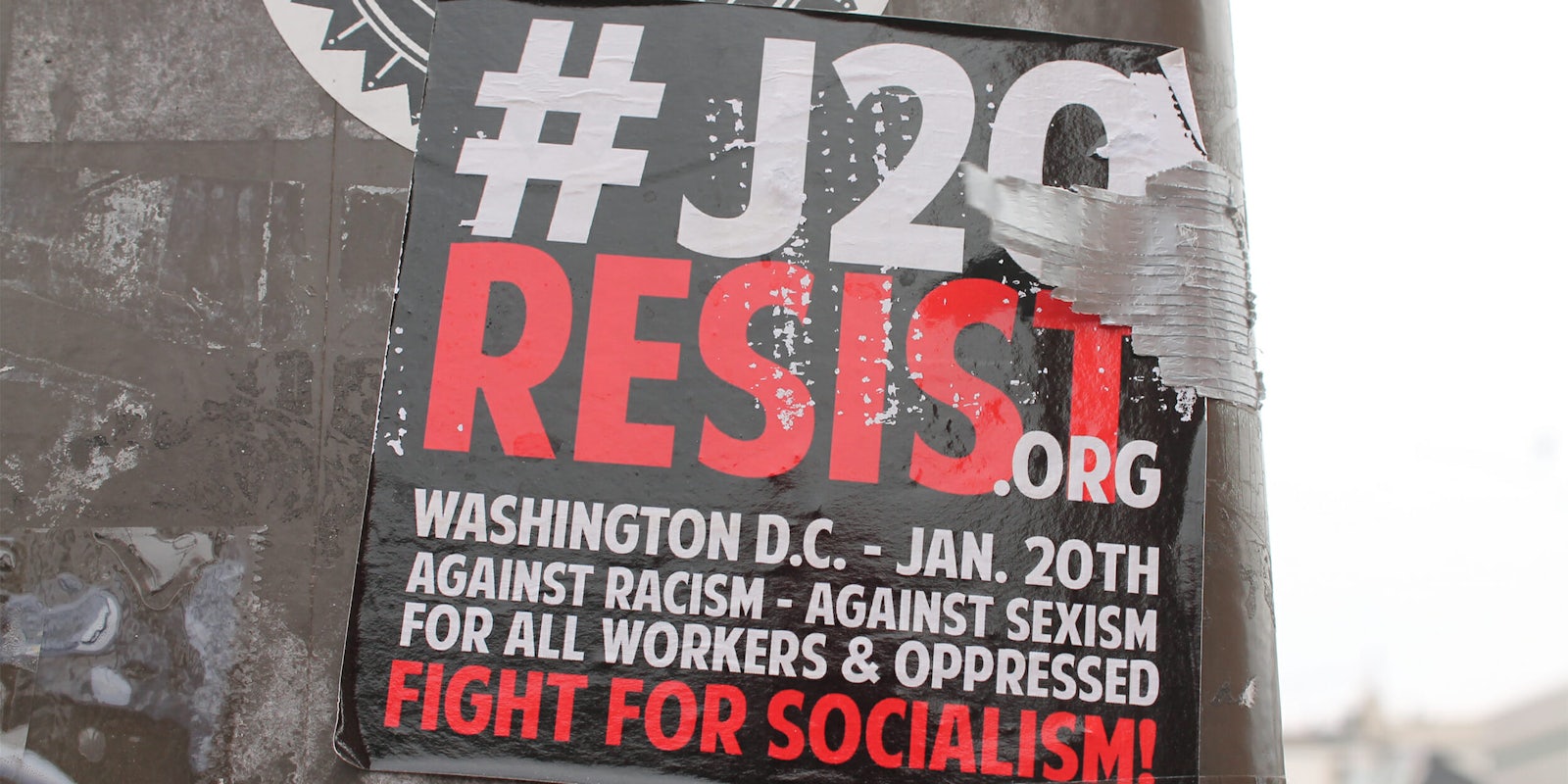Opinion
For many of us, now a year removed from Donald Trump’s election, his inauguration is a fading memory. For some who took to the streets in protest on Jan. 20, that day is an enduring nightmare.
Over 230 people were arrested indiscriminately by the increasingly authoritarian Justice Department that day. Some protesters are being charged with up to 80 years in prison—a punishment so harsh it should send fear into the hearts of even the most strictly law-abiding Americans.
This week, on Nov. 15, the first group of seven protesters began their day in court. The rest of the protesters will see court dates throughout the coming year. Many of those arrested are facing the kind of charges that would be dreamt up by a banana republic strongman. In addition to the charge of felony rioting, which carries a maximum sentence of 10 years, the court added a number of additional charges such as urging to riot, conspiracy to riot, and destruction of property. The DOJ has maintain their aggressive stance since the protesters were first arrested in late January. In April, it handed down 13 additional charges.
The arrests occurred following the use of a police tactic called “kettling” in which cops block off a space during a demonstration and arrest everyone inside of it. Legal experts say that this tactic hasn’t been used since 2002, when a mass arrest was ruled unconstitutional and led to a policy change by the Washington, D.C. police.
Using the vague concept of “rioting” as an excuse for kettling and the ensuing blanket charges has allowed the D.C. police to charge hundreds of people over a relatively small number of broken windows, graffiti, and property damage. The Metropolitan Police accuse some of “hurling projectiles, injuring at least six officers.” Lawyers close to the situation have said that 200 people are being charged with breaking the same few windows— hardly a crime worthy of 80 years behind bars.
It is unlikely that many of those who were arrested even participated in criminal activity. A number of people who have been charged weren’t even at the inauguration as protestors. According to DefendJ20Resistance.org, a number of those charged are journalists and street medics. They are being charged the same as everyone else.
The government didn’t stop there. The Department of Justice has also attempted to seize 1.3 million IP addresses of people who merely visited the Disrupt J20 website. The DOJ asked for “any email addresses, user logs, and photos collected by the website.” Dreamhost, the site’s host, fought off the request, but the Justice Department has continued to press for sensitive information from the site. Judges have forced Dreamhost to comply with some of the DOJ’s requests but have ruled out have ruled out handing over IP addresses.
Viewed as a whole, these arrests and the subsequent investigation around them marks a “radical departure” from traditional law enforcement, activist Sam Menefee-Libby told the Intercept. The government’s approach has been to charge everyone with the crimes committed that day rather than attempt to distinguish who did what. As Menefee-Libby put it, “Individuals can only be held responsible for their own behavior.” These arrests are a clear attempt by the Justice Department and the broader Trump administration to redefine the reality of free assembly in America.
How They’re Fighting Back
There is an encouraging side to this story. While a handful of those charged have entered plea deals, 130 of the protesters and activists have signed a so-called “Points of Unity” agreement, a pledge to reject plea deals and/or cooperations with prosecutors at the expense of their co-defendants. Additionally, 21 of the defendants have motioned to have their cases dismissed.
Many inside and outside the legal community see J20 arrests as a particularly dangerous precedent. This has led lawyers, civil society groups like the American Civil Liberties Union, and concerned citizens to get involved in these cases.
Citizens and activists in the greater D.C. area have formed the Dead City Legal Posse (of which Menefee-Libby is a member), a group dedicated to helping those arrested on Inauguration Day and providing “any and all manner of personal and/or practical support to these charged persons, through final disposition of their cases.” While they are not lawyers, the group is providing housing, transportation, data collection, and ensuring all those who face charges are represented.
One crucial service the group offers is court support. Legba Carrefour, a member of DCLP, told Pacific Standard that this involves checking in with defendant on the day of their trial and taking notes on the hearing. The idea is to fight against the state’s strategy of dividing the protestors. As Carrefour put it, “It’s important to work to keep people connected. It also makes them less likely to snitch, which is better for them, and for everyone involved.”
As these trials begin, the protesters continue to stand together in the face of government pressure. Last week, DisruptJ20Resistance issued a press release on behalf of the first seven defendants whose trial began on Wednesday. In the statement DisruptJ20’s Kris Hermes offered this:
“It’s indefensible that the government is spending millions of dollars to take nearly 200 people to trial for protesting Trump’s inauguration. These trials, and the decades in prison that each defendant is facing, represent an aggressive attempt by the Trump administration to criminalize and stifle dissent.”
As early as this week, we will see the new realities of free assembly and free speech in Trump’s America.
